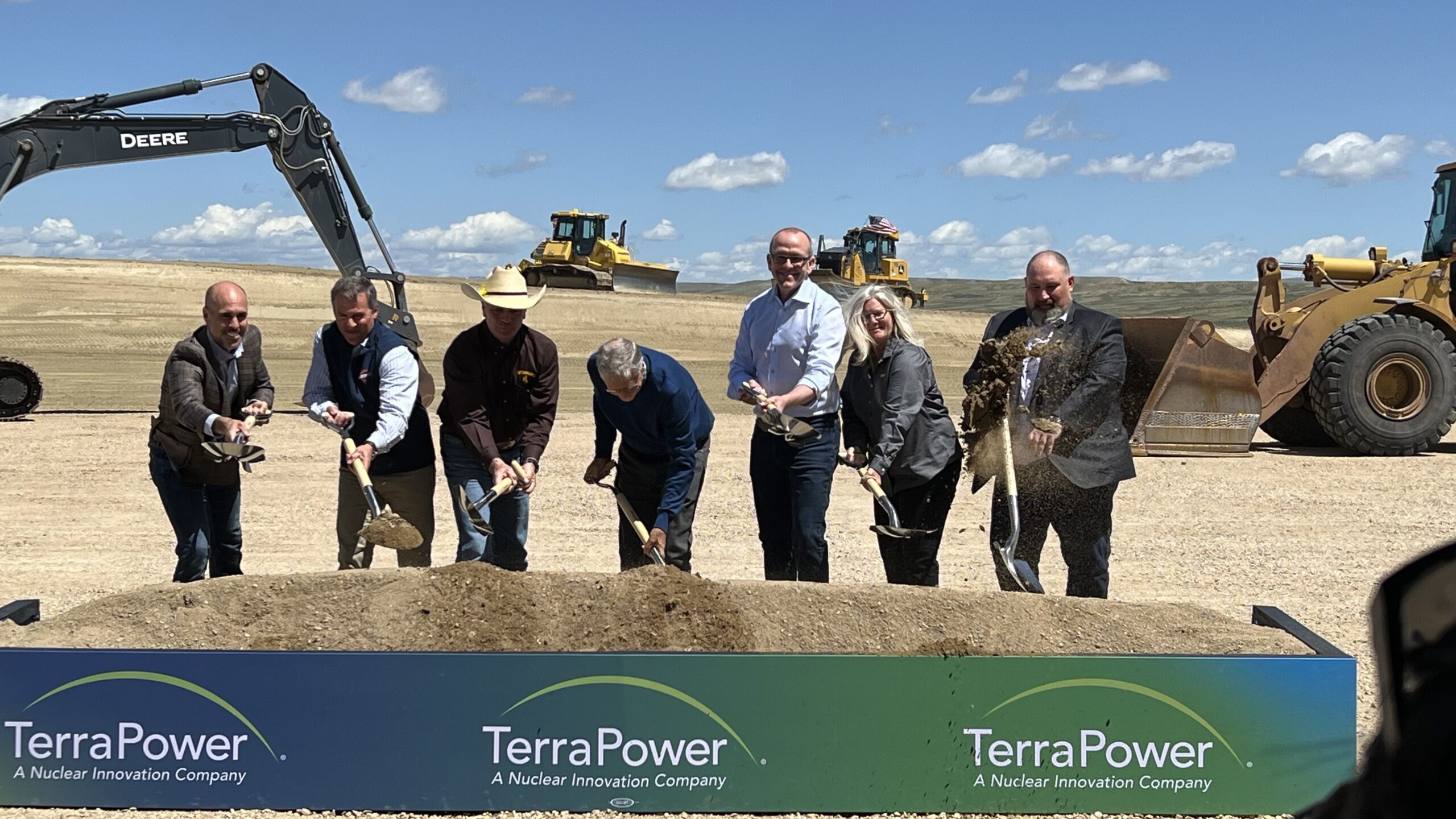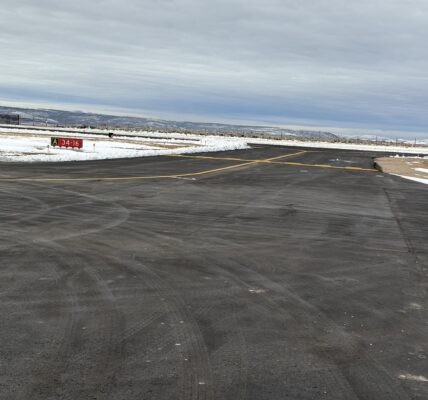
• Not everyone is ready for it
By Zak Sonntag
Casper Star-Tribune
Via- Wyoming News Exchange
CASPER — Triangle Park in downtown Kemmerer, best known for being the location of the JC Penney “mother store,” offers a high contrast snapshot of a city on the precipice of major change.
Among the district’s century-old, brick and wood-shingled storefronts stands the Fossil Fuel coffee shop, which inside is indistinguishable from a cafe scene you’d come across in a city like Los Angeles: Gen Z baristas serving up specialty lattes, millennials wearing Air Pods and Ray Ban sunglasses plunking away on laptops working remotely.
Last Monday, the patrons were there for a special event: The groundbreaking ceremony of the nuclear technology company TerraPower’s Natrium demonstration project, a first-of-its-kind small modular reactor to be built at the site of the nearby Naughton Power Plant.
The project has drawn international attention and is seen by nuclear enthusiasts as the herald of a new energy paradigm.
For local Kemmerer residents, though, emotions are mixed, as it represents a shift that not everyone here is eager to see.
Outside the Fossil Fuel coffee shop, a protest group revved through Triangle Park in pickups, honking and hollering, political flags rippling in their wake. They’re known as the “Trump Train,” and they’d come to “display…patriotism for our ‘Special Guest,’” its organizer, Em Hart, explained on Facebook.
It was a reference to TerraPower’s billionaire backer, Bill Gates, around town called “Billy Bob,” a quietly derisive moniker for a man whose left-leaning politics have sullied this moment in the eyes of the city’s deeply red residents. It’s a common topic of conversation at Grumpies Bar, a popular watering hole where explicit political banners and unvarnished opinions exhibit freely.
Owner Teri Picerno, a woman with short cropped platinum hair and a raspy laugh, boiled down the community’s attitude this way.
“We like the idea of a boost to our economy, but we’re not happy about Bill Gates being involved. That’s the easiest way to sum it up,” she explained between drags on a Marlboro Gold, adding, “He might be a nice guy, but I don’t like a lot of the things he stands for,” including statements he’s made about the Covid pandemic and over population.
The city’s equivocal feelings go beyond partisan attitudes, as many here see Natrium not merely as the start of something new, but also as the symbolic bookend of a resource they don’t want to see go away — coal, which for over a century has been both an economic bedrock and central component of the town’s identity.
PacifiCorp, parent company of Wyoming’s biggest utility, Rocky Mountain Power, earlier this year signed a memorandum of understanding with TerraPower to purchase energy from the Natrium reactor for its Naughton Power Plant in Kemmerer, and ahead of that deployment in 2026 plans to shutter the plant’s remaining coal-burning units followed by the retirement of its gas plant a decade later.
The community is not happy about it.
“Kemmerer was started on the coal mines and the railroad. Mining has always been the historic anchor here and it’s ingrained in the history of these families,” said Picerno. “So any talk of diminishing the importance of coal doesn’t sit well with people, and some are really ticked off.”
The company said it already intends to close the coal plants with or without access to nuclear power; cheaper forms of fuel and federal emissions regulations have made coal-generation uncompetitive in the utility market.
Still, the optics are problematic for a community where fifth generation coal miners are on the verge of displacement.
Even the town’s optimists see the moment as a double edged.
Linda Slovernick, manager of the JC Penney mother store, is hopeful the TerraPower investment will spur shopping at a time when retail business is slow.
Nonetheless, she has big reservations because her husband — an operations manager at the Kemmerer coal mine — is likely to lose his job with the 2026 closure of the Naughton plants, which she sees as an inseparable repercussion of the Natrium development.
“I’m excited because this store will probably do really well. But I’m on the fence because it’s hard to be excited when my husband will probably be displaced from his job,” she said.
The company has guaranteed job replacement for Naughton plant workers and community members who want to work at Natrium, which on its face looks like a mutual win.
“These are highly skilled workers that burn coal to make steam to produce electricity, and we have a nuclear reaction to make steam to produce electricity. We’ll need the skills they have. We’ve made very clear that all the current employees at the Naughton plant that want to come and work with us at Natrium will have a job,” Jeff Navin, director of external affairs for TerraPower, told the Star-Tribune. “I don’t know of any other coal transition plan that’s made that as explicitly clear as we have.”
The Naughton power plant this year had its 60th anniversary and currently employs just more than 100 workers.
Upon completion, Natrium will employ around 200 full-time workers and will operate with a 60-year license along with an option to extend an additional 20 years of operation, meaning it could be a viable economic spigot in Kemmerer for close to a century.
Construction of the plant will take place in three phases, beginning with a test facility, then a worker training facility and finally the reactor facility, with continual construction up until the plant is turned on in 2030.
While construction and operations workers are likely to boost spending and local businesses, community members are nervous how the influx of workers will impact infrastructure, housing, and the town’s social fabric.
Like small towns throughout the state, Kemmerer has seen boom and bust cycles before, and residents say big energy projects aren’t all delight.
The Natrium groundbreaking has jogged memories from previous project booms, including refinery and gas plant projects from ExxonMobil, which brought a rowdy crowd of workers and even a spike in crime, locals say.
“This is a place where people don’t lock their doors at night, and where they leave their cars unlocked with a hunting rifle right in the back window because we all trust each other. That’s going to have to change. It’s not going to be Mayberry anymore,” said Cherie Paulson, elementary school teacher, referring to the quaint frictional setting of the Andy Griffith Show.
Peak workforce is expected to be around 1,500 workers, and currently local officials say there is not enough housing to accommodate them, nor the amenities that would encourage workers to spend money locally.
For instance, before the groundbreaking ceremony, visitors ambled down main street looking for a hot breakfast with bacon and eggs, but the only spot where they might have got it, the Place on Pine restaurant, is closed on Mondays.
The area has a single-screen movie theater open three days a week. The city’s biggest auto dealership, Heritage Auto, is closing at the end of the year. The former Days Market grocery idles in a crumbling asphalt lot, and has for years.
It’s among the reasons workers who’ve come here on other energy projects have chosen to live and commute — and spend their wages — in nearby cities of Evanston and Rock Springs.
“We need more amenities. We’ve got one grocery store, a few restaurants. So if you’re looking to live somewhere, as a family, workers might opt for Evanston or Green River just so they’d have things to do,” said Eric Backman, councilmember in sister city Diamondville.
However, Backman and other leaders say the Natrium plans have incentivized new capital investment, including two housing subdivisions and two apartment complex overhauls.
The Stock Exchange bar at Triangle Park recently sold after a year on the market, Backman said.
“We’ve got a big apartment complex that just sold and now they’re gutting it out and redoing it and putting a lot of money into it. Offices are getting revamped downtown. So slowly I think that [Natrium] is bringing some outside capital to our community and could bring some economic diversity. But for now we’re all just kind of waiting to see what happens,” Backman said.
Connie McMillen, 75, a coal miner’s daughter and life-long Kemmerer resident has seen companies come and go, but she feels like this time it will be different.
“It’s wonderful that we’re going to have the population and economy to support our town. But it is going to bring changes that we’ve never seen before,” she said.





